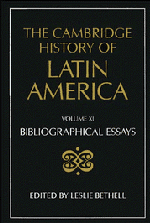Book contents
- Frontmatter
- I THE INDIGENOUS PEOPLES OF MIDDLE AND SOUTH AMERICA ON THE EVE OF THE CONQUEST
- II COLONIAL SPANISH AMERICA
- III COLONIAL BRAZIL
- IV THE INDEPENDENCE OF LATIN AMERICA
- V LATIN AMERICA: ECONOMY, SOCIETY, POLITICS, c. 1820 TO c. 1870
- VI LATIN AMERICA: ECONOMY, SOCIETY, POLITICS, c. 1870 to 1930
- VII LATIN AMERICA: ECONOMY, SOCIETY, POLITICS, 1930 to c. 1990
- VIII IDEAS IN LATIN AMERICA SINCE INDEPENDENCE
- 1 Political and social ideas, 1830–1930
- 2 The multiverse of Latin American identity, c. 1920–c. 1970
- 3 Economic ideas and ideologies since 1930
- 4 Science in twentieth-century Latin America
- IX LATIN AMERICAN CULTURE SINCE INDEPENDENCE
- X THE INTERNATIONAL RELATIONS OF LATIN AMERICA SINCE INDEPENDENCE
- THE CAMBRIDGE HISTORY OF LATIN AMERICA
3 - Economic ideas and ideologies since 1930
from VIII - IDEAS IN LATIN AMERICA SINCE INDEPENDENCE
Published online by Cambridge University Press: 28 March 2008
- Frontmatter
- I THE INDIGENOUS PEOPLES OF MIDDLE AND SOUTH AMERICA ON THE EVE OF THE CONQUEST
- II COLONIAL SPANISH AMERICA
- III COLONIAL BRAZIL
- IV THE INDEPENDENCE OF LATIN AMERICA
- V LATIN AMERICA: ECONOMY, SOCIETY, POLITICS, c. 1820 TO c. 1870
- VI LATIN AMERICA: ECONOMY, SOCIETY, POLITICS, c. 1870 to 1930
- VII LATIN AMERICA: ECONOMY, SOCIETY, POLITICS, 1930 to c. 1990
- VIII IDEAS IN LATIN AMERICA SINCE INDEPENDENCE
- 1 Political and social ideas, 1830–1930
- 2 The multiverse of Latin American identity, c. 1920–c. 1970
- 3 Economic ideas and ideologies since 1930
- 4 Science in twentieth-century Latin America
- IX LATIN AMERICAN CULTURE SINCE INDEPENDENCE
- X THE INTERNATIONAL RELATIONS OF LATIN AMERICA SINCE INDEPENDENCE
- THE CAMBRIDGE HISTORY OF LATIN AMERICA
Summary
For general surveys of the development of economic thought in Latin America since the Second World War, see Albert Fishlow, ‘The state of Latin American economies’, in Inter-American Development Bank, Economic and Social Progress in Latin America: 1985 Report (Washington, D. C., 1986), 123–48; republished in Christopher Mitchell (ed.), Changing Perspectives in Latin American Studies: Insights from Six Disciplines (Stanford, Calif., 1988). Fishlow covers the rise and decline of the several schools of thought, based on their policy outcomes. Also valuable is Cristóbal Kay, Latin American Theories of Development and Underdevelopment (London, 1989), which offers a sympathetic but critical review of structuralism and dependency and related works on marginality and internal colonialism. A briefer survey which gives particular attention to policy issues is Felipe Pazos, ‘Cincuenta años de pensamiento económico en la América Latina’, TE, 50/4 (1983), 1915–48. An old but still useful survey of Latin American adaptations of extracontinental ideas is Juan Noyola Vázquez, ‘La evolución del pensamiento económico del último cuarto de siglo y su influencia en la América Latina’, TE, 23/3 (1956), 269–83.
Three works may serve to indicate the impact of Latin American ideas on development theory at large. H. W. Arndt, Economic Development: The History of an Idea (Chicago, 1987), especially 119–30, places structuralism and dependency in broad historical context. Björn Hettne, Development Theory and the Three Worlds (Harlow, Eng., 1990), attempts to address underdevelopment and development in a non-Eurocentric and interdisciplinary framework, and in this context Latin American ideas play a prominent role. Dieter Senghaas, The European Experience: A Historical Critique of Development Theory (Dover, N.H., 1985), incorporates structuralist and dependency perspectives in a comparative treatment of European and non-European economic development, emphasizing ‘selective de-linking’ as a historically-proven development strategy.
- Type
- Chapter
- Information
- The Cambridge History of Latin America , pp. 873 - 878Publisher: Cambridge University PressPrint publication year: 1995
- 3
- Cited by



